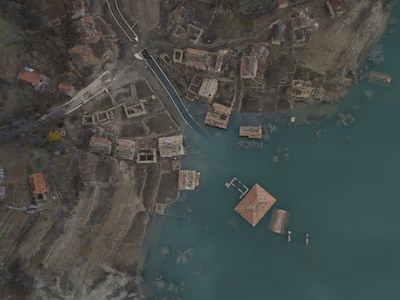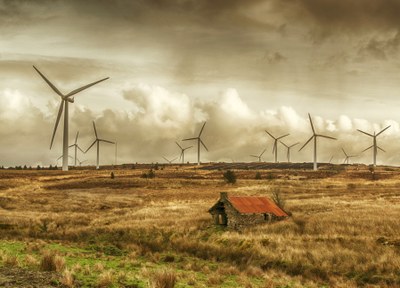All official European Union website addresses are in the europa.eu domain.
See all EU institutions and bodiesThe EEA issues press releases on key assessments and institutional developments. They are then disseminated to our subscribers and shared with journalists and the wider public. You can filter our press releases by topic through the search function. See below for our latest press releases:
Exposure to pollution linked to depression, anxiety and other mental health issues
03 Mar 2026
Reducing pollution, in line with the EU Zero Pollution action plan, could improve mental health across Europe, according to an EEA briefing published today. The publication covers the links between air pollution, noise and chemical pollution to mental health issues, as well as opportunities for action – including the positive effects of nature-based solutions on mental wellbeing.

Industrial transformation key to cutting emissions and pollution further in Europe’s energy-intensive industries
25 Feb 2026
Emissions from energy-intensive industries in Europe have fallen sharply over the past two decades, but progress has stalled and the health-related costs of pollution remain high, according to a new European Environment Agency (EEA) briefing. Further reductions will require deeper industrial transformation, alongside full implementation of existing EU environmental legislation.

Rail offers a major opportunity for Europe to cut transport emissions, as road transport still dominates
10 Feb 2026
Transport remains Europe’s most persistent climate challenge. While rail offers a low-emission alternative for moving people and goods, Europe’s continued reliance on road transport is keeping greenhouse gas and pollutant emissions high, according to a report published today by the European Environment Agency.

Fire and ice: how satellite data helps illustrate Europe’s changing landscape
09 Feb 2026
Despite an ice-cold winter with more snow this year, climate change is having a dramatic impact on Europe’s snow cover which is in steady decline. Meanwhile tectonic shifts at the Mid-Atlantic Ridge in Iceland have seen dramatic changes to the landscape there due to volcanic eruptions, which is just one example of how the ground continues to shift across Europe. These are the some of the issues raised in the first two data-driven ‘snapshot’ stories launched today by the European Environment Agency, which aim to highlight the value of data and imagery available through the Copernicus Land Monitoring Service (CLMS).

Overheated and underprepared: European survey finds citizens concerned about heat and ability to cope with climate change
04 Feb 2026
Europeans are very concerned about extreme heat and other impacts of climate change like wildfires according to the results of a Europe-wide survey published today. It found that many citizens were also underprepared to deal with the increasing frequency and magnitude of heatwaves, flooding, or water shortages in their own homes.

Investing in climate adaptation strengthens European competitiveness
12 Jan 2026
Climate-proofing the agriculture, energy and transport sectors would help avoid billions of euros in losses from the accelerating extreme weather events related to climate change. At the same time, it would increase Europe’s competitiveness, according to a briefing published today by the European Environment Agency (EEA).

Challenging outlook for meeting the EU’s long-term environment and climate objectives
10 Dec 2025
Despite progress in key areas, the European Union (EU) remains likely off track for most 2030 environmental goals, according to the European Environment Agency’s (EEA) new 8th EAP assessment. Rising climate risks, slow transitions in production and consumption system and weakening enabling conditions highlight the urgent need for stronger, better financed and faster policy implementation.

New European Scientific Advisory Board on Climate Change appointed
05 Dec 2025
T he Management Board of the European Environment Agency (EEA) designated yesterday the EU scientific experts that will be members of the European Scientific Advisory Board on Climate Change for its second term, from 2026 until 2030. The independent advisory body, tasked to provide the European Union (EU) with scientific knowledge, expertise and advice relating to climate change, will begin its second term on 24 March 2026.

Air quality improving, but just over 180,000 deaths still attributable to air pollution in EU
01 Dec 2025
Just over 180,000 deaths in the European Union were attributable to exposure to fine particulate matter (PM 2.5 ) concentrations above World Health Organization WHO guideline levels in 2023, according to the latest European Environment Agency (EEA) air quality health impact assessment published today.

Better air quality monitoring needed amid rising air pollution from ports and airports
27 Nov 2025
Air pollutant emissions from shipping and aviation are rising, posing an increasing risk to human health, especially for those living near ports and airports, according to a European Environment Agency (EEA) briefing published today. The briefing calls for improved monitoring of air pollution in and around these key transportation hubs.

Regional launch of Europe’s environment 2025 marks two decades of partnership with EEA’s cooperating countries
25 Nov 2025
The most comprehensive report on Europe’s environment, climate and sustainability —Europe’s environment 2025— is being officially launched today in Podgorica for the Western Balkans region. The event celebrates more than two decades of cooperation between the European Environment Agency (EEA) and the six Western Balkan countries.

Europe-wide monitoring for antimicrobial resistance in surface waters can help improve data on health risks
18 Nov 2025
Monitoring of antimicrobial resistance (AMR) is needed to better protect public health, according to a European Environment Agency (EEA) study published today, which identifies priorities for setting up Europe-wide monitoring of antimicrobial resistance in the aquatic environment.

Europe’s adaptation policies advance, but stronger action is needed to address growing climate risks
06 Nov 2025
While European countries have made substantial progress in planning for climate adaptation, and with adopting policies, the latest European Environment Agency (EEA) review of national climate adaptation actions published today highlights that implementation and evaluation need to be significantly strengthened to ensure actions effectively address the escalating climate risks Europe faces.

Trends and projections: greenhouse gas emissions largely on track to 2030 targets
06 Nov 2025
The European Union remains largely on track to achieve its 2030 targets to reduce net greenhouse gas emissions, according to the latest annual check-up on EU progress to its energy and climate targets published by the European Environment Agency today. Total net greenhouse gas emissions in the EU fell by a further 2.5% in 2024, according to estimated figures included in the ‘Trends and projections’ report.

One in five cardiovascular deaths in the EU, preventable by improving the environment
03 Nov 2025
Environmental factors, such as air pollution, extreme temperatures, and exposure to harmful chemicals, cause around one in five cardiovascular deaths in the European Union (EU) — yet, these risks can be prevented. A European Environment Agency (EEA) briefing published today shows that environmental policies can protect millions of Europeans from heart disease and save lives.

How to make European forests resilient to wildfires by working with nature
29 Oct 2025
Nature-based solutions are key to reducing Europe’s growing risk of forest fires and to making forests more resilient to climate change, according to a briefing published today by the European Environment Agency (EEA).

State of Europe’s environment not good: threats to nature and impacts of climate change top challenges
29 Sept 2025
Significant progress has been made in reducing greenhouse gas emissions and air pollution, but the overall state of Europe’s environment is not good, especially its nature which continues to face degradation, overexploitation and biodiversity loss. The impacts of accelerating climate change are also an urgent challenge, according to the European Environment Agency’s (EEA) most comprehensive, ‘state of environment’ report, published today. The outlook for most environmental trends is concerning and poses major risks to Europe’s economic prosperity, security and quality of life.

Public and jury chose the winning images of “Environment&Me 2025” photo competition
25 Jul 2025
An aerial photograph capturing the striking contrast between cracked, dry earth and turquoise waters at Burdur Lake in Türkiye wins the Public Choice Award for the annual photo competition organised by the European Environment Agency (EEA). The three thematic category prizes were awarded to photographs from Sweden and Spain.

Nordic capitals rank as cleanest in updated European city air quality viewer
04 Jul 2025
What is the level of air pollution in your city? Stockholm, Reykjavik and Helsinki rank as the cleanest European capital cities in terms of air quality in the updated European Environment Agency’s (EEA) European city air quality viewer published today.

More bio-based innovation can help reduce environmental impacts, boost Europe’s bioeconomy and sustainability
03 Jul 2025
Europe’s environmental footprint beyond its borders remains high as it continues to rely on goods from key sectors including forestry, grain and energy according to a European Environment Agency (EEA) assessment published today. The study highlights the environmental impacts linked to these imports and underscores the need to accelerate bio-based innovations as part of a bioeconomy to develop more home-grown sourcing strategies that can boost Europe’s path to sustainability.

Extreme weather in a changing climate: Is Europe prepared?
02 Jul 2025
With European countries facing another year of damaging heatwaves, drought and other extreme weather events, how prepared and resilient are they to handle these events? A new interactive European Environment Agency (EEA) product published today looks at key climate change impacts and adaptation and preparedness actions.

Vote now to pick winner of this year’s EEA Environment&Me photo competition Public Choice Award
01 Jul 2025
Which one is your favourite? Voting is now open to cast your vote to pick the winner of this year’s Public Choice Award for the European Environment Agency’s (EEA) ‘Environment&Me’ photo competition 2025.

Europe’s land carbon sink declines, but its potential stays high
30 Jun 2025
Europe’s forests and land are absorbing less carbon than expected, putting the 2030 target for the sector at risk. But with the right policies and measures, the land use and forestry sector could still play a crucial role in climate mitigation, with significant co-benefits for people and nature, according to a new European Environment Agency (EEA) report published today.

Emissions of key air pollutants targeted for reductions in EU Member States continue to drop, slower progress for ammonia
27 Jun 2025
Key air pollutant emissions targeted for reductions and monitored under EU legislation continued to decline across most EU Member States, according to the latest data assessment published by the European Environment Agency (EEA) today. However, reducing ammonia emissions continues to present a bigger challenge.

Renewables and electrification: key to cutting costs and powering EU’s clean industry and competitiveness
26 Jun 2025
Scaling up renewable electricity sources across the EU could reduce electricity generation costs, improve energy independence, and support the transition towards clean industry, according to a European Environment Agency (EEA) report published today. At the same time, accelerating the electrification of heating, transport and industry is needed to support Europe’s clean and competitive future.


